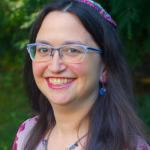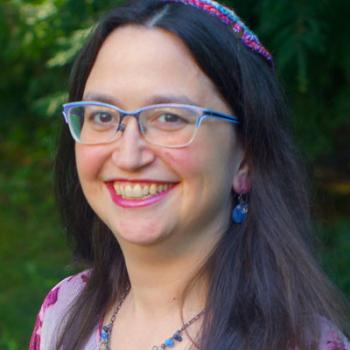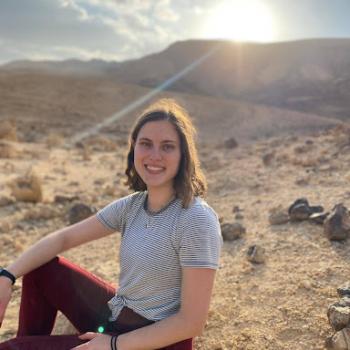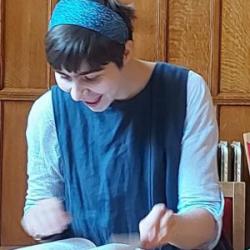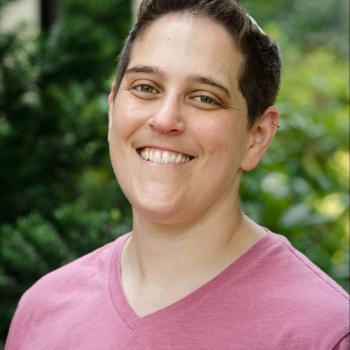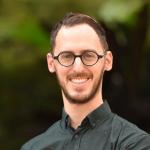By Rabbi Adam Lavitt, ’12, Director of Learning, Jewish Studio Project
Parashat Devarim Deuteronomy 1:1-3:22
Each year, as Tisha B’Av approaches — our day of collective mourning — we carry both ancient sorrow and the ruptures of our own time. Through the poetry of Eicha and the remembrance of generations of suffering, we open to heartbreak both personal and historic. But just before we fully inhabit our grief, we hear Moses in parashat Devarim — beginning a long farewell, speaking across a river he will never cross. His body remains behind, but his voice reaches forward, echoing in the fragile immediacy of human speech to meet our moment.
The parasha opens:
אֵ֣לֶּה הַדְּבָרִ֗ים אֲשֶׁ֨ר דִּבֶּ֤ר מֹשֶׁה֙ אֶל־כָּל־יִשְׂרָאֵ֔ל בְּעֵ֖בֶר הַיַּרְדֵּ֑ן
“These are the words Moses addressed to all Israel on the far side of the Jordan” (Deut. 1:1).
This year especially, we stand at a painful threshold: fractured by war, disoriented by fear and polarization, yearning for clarity and connection. We sense we’re living in a fragment of history that may be remembered, a time future generations will ask about. Like Moses, we are trying to speak from our losses into a future we long for, to cross a chasm with nothing but our trembling voices.
Moses speaks at another pivotal moment: the Israelites have wandered forty years, a generation has died, and a new one now stands ready to enter a land he will never inhabit. He knows they can’t fully grasp what’s come before. And since he can’t go with them, he offers something else: a bridge made of words — fragile and shimmering, catching light like thread in the wind.
The 17th-century Moroccan commentator Or HaChayyim notes that these are Moses’s own words — not dictated by God, but shaped by his own voice. Once “not a man of words,” Moses now speaks from lived experience. His transformation is a testament to the power of human expression — of finding, when all else fails, a path forward through breath and vibration.
Maybe his voice cracks. Maybe he pauses between sentences, summoning speech from a place deeper than memory. Perhaps the people sense the weight of everything Moses is not saying, the unbearable weight of what he will never experience. There’s no guarantee his words will land. The distance between speaker and listener, past and future, is vast. But still, Moses tries.
What Moses offers through this attempt is more than recollection — it’s reimagining: personal, interpretive, formed in the crucible of wilderness, failure, and love. In Jewish tradition, midrash refers to the creative process of interpreting and expanding on Torah: dreaming into its gaps, asking new questions, unearthing new meaning. In this light, Moses’s address becomes something like a first midrash: not a divine monologue, but a deeply human rendering of a journey too vast and complex for a single, linear telling.
Again and again, one root emerges from Moses’s mouth as he speaks: .ע.ב.ר — to pass through, to cross, to carry. It appears 18 times in this parasha — the numerical equivalent of chai, “life”. With each repetition, Moses chants a kind of crossing-spell — a rhythm threading memory into meaning, stitching past to future. A way to get from here to there without leaving at all.
There’s a teaching here: that shaping experience into expression, even when the stories are familiar and the impact of sharing them uncertain, can still be a creative act. Not because the material is entirely new, but because we are. As we speak from where we stand — with our unique role, voice, and vision — we refract memory through the ever-shifting kaleidoscope of this moment. Moses doesn’t just recount history; he rearranges and reframes it, choosing what to emphasize and what to omit. He draws on the raw material of memory and molds it into a form others can absorb. In doing so, he transmutes collective struggle into nourishment. His speech becomes not a frozen record, but living, breathing Torah.
In doing so, Moses touches those already standing in a place he will never reach. He offers not certainty, but companionship. Not clarity, but courage to speak from his own particular experience. Even if his feet cannot cross, his words, woven of recollection and imagination, stretch across the river and across generations.
This, then, is Moses’s final act of leadership, and perhaps his most profound. Not military strategy, not legislation, not miracles — but the courage to shape personal experience into a form others can receive. To transform memory into transmission. To trust that his words, human, uncertain, and enduring, might carry across a distance he himself cannot.
It’s a model of leadership rooted not in hierarchical power, but in the connectivity that creativity makes possible. Moses shows that when doors appear to close, story and imagination can open new ones; that when we cannot travel further with our bodies, we can reach with our voice. That even what once felt like our greatest limitations (in Moses’s case, his struggle with speech) might become the very path through which we create something lasting.
Today, we too stand b’ever haYarden, on the shore of something vast and uncertain. The horizon ahead is murky. The waters before us are cold and deep. We are heavy with sorrow, frozen by all we do not know. As we prepare for Tisha B’Av, we sit with devastation, ancient and immediate, and wonder what kind of future can grow out of so much loss.
As we do, may we draw courage from Moses’s offering. May we grieve what’s been lost, and let sorrow move through us: not to close us down, but to gently open us to what else might be asking to emerge.
May we begin to shape what we do not yet fully understand into offerings — of voice, of body, of imagination. And in doing so, may we too become Ivrim (עברים): ones who cross over.
From fragmentation to wholeness.
From silence to story.
From despair to shimmering hope.
Rabbi Adam Lavitt ’12 is a spiritual companion, educator, and creative facilitator committed to helping people connect with their inner wisdom and explore what matters most. He serves as Director of Learning at Jewish Studio Project (JSP), where he guides educators, clergy, and seekers in integrating creativity and spiritual practice into their lives and work. Ordained by Hebrew College in 2012, Adam brings a background in pastoral care and chaplaincy to his work at the intersection of healing, imagination, and Jewish learning.


